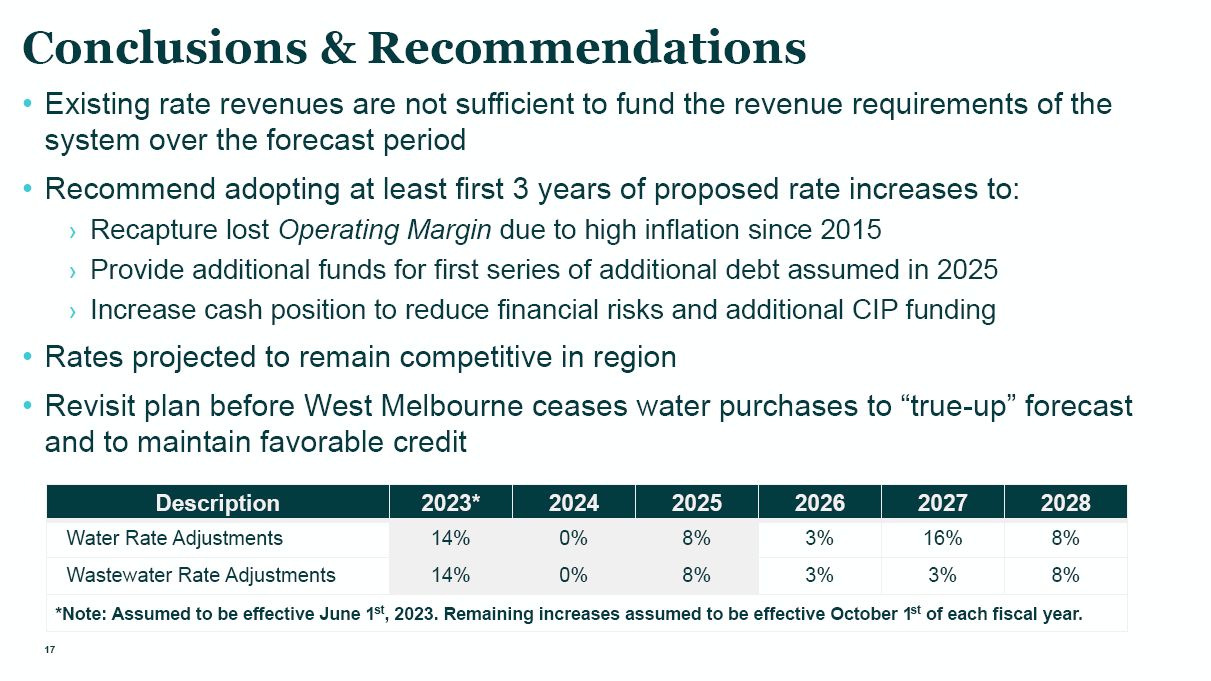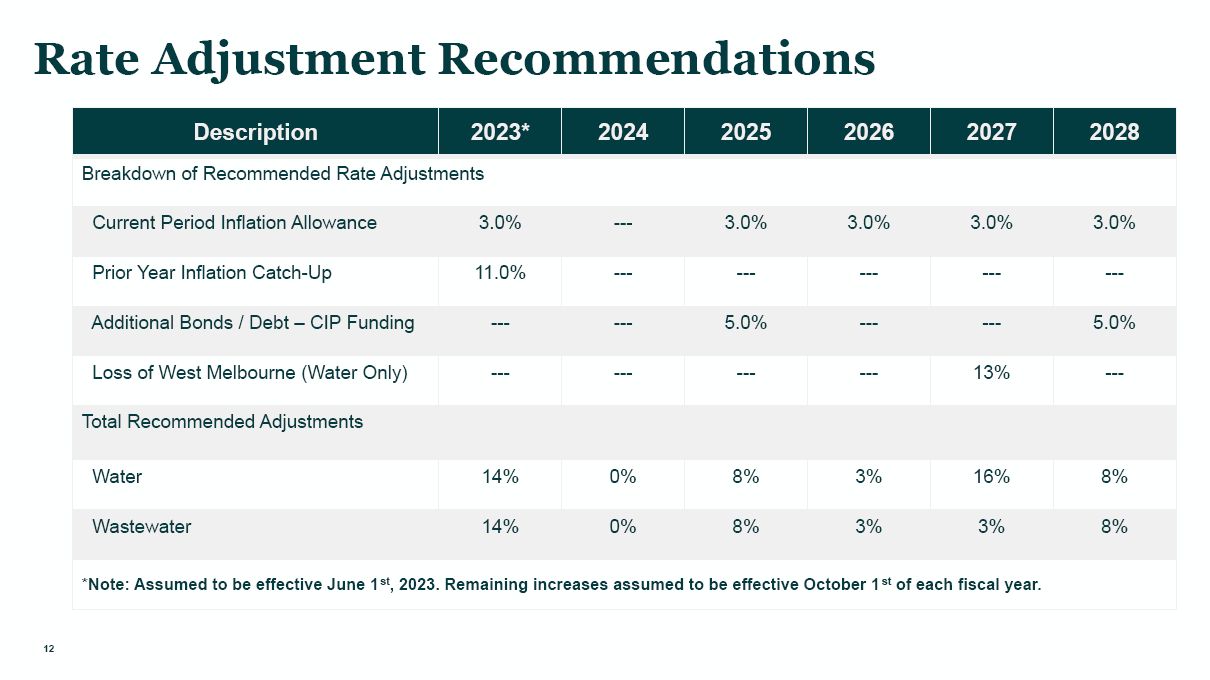MELBOURNE, Fla. — Years of stagnant water and wastewater rates for customers of the City of Melbourne will be coming to a close in the near future.
Following a study from and recommendation by Maitland-based consulting firm Raftelis, a series of rate increases are set to begin starting in June 2023.
What You Need To Know
- The City of Melbourne voted to increase water and wastewater rates by 14 percent starting on June 1
- The rate increase came as a result of a Water and Wastewater Revenue Sufficiency Study
- The rates for city customers haven’t changed since 2015
- The council will determine at a later time if and when they want to adopt the rest of the recommendations from the study, following FY25
During the Feb. 28 city council, councilmembers unanimously approved both wastewater and water bills going up by 14 percent beginning June 1. They also approved eight percent increases for both wastewater and water in FY25, which begins Oct. 1, 2024.
Currently, the average Melbourne residential water customer as a combined water and wastewater bill of $65.51, assuming an average consumption of 4,000 gallons. That rate places its customers in between the average rates paid by customers of St. Luce West Services District and those of Martin County.
The new approved increase will bump Melbourne customers to just above those in the Titusville customer area, but still below current rates paid by customers of both Palm Bay and Cocoa in Brevard County. It also brings the City of Melbourne to slightly over the average across nearby water districts in Florida, which is currently $74.69.
During the presentation to the city, the following water and wastewater increase were suggested, with Raftelis and the city finance director recommending adopting at least the first three years of changes:

During that Feb. 28 city council meeting, Robert Ori, the executive vice president of Raftelis Financials Consultants, Inc., said that part of the reason they’re starting with a 14 percent bump this year is, in part, to catch up on inflation from the past seven years that hasn’t been reflected in rates since 2015.
“Since 2015, the CPI (Consumer Price Index) index has risen over 25 percent, but more importantly, over the last two years, it’s been about half of that, about 13, 14 percent” Ori said. “I can tell you that the CPI index for ’21 and ’22 was over 13 percent. If you look at the Engineering News Record Construction Index, that is almost 12 percent in two years.”
He said the rise of inflation is shrinking the city’s operating margins, leaving fewer dollars leftover after paying off operating costs.
“If those margins are dropping, the amount of ability to fund capital is critical and it could get impacted,” Ori said.
The City of Melbourne is in the midst of its current, six-year Capital Improvement Plan, part of which includes $304 million in projects, like $59.1 million for plant improvements and expansions and $22.7 million for new raw water wells. Part of the process of paying for those is taking out additional debt.
In addition to that, Ori said there were two other challenges for the city, one of them being that customer growth over the past six years has hovered around one percent or less. If sustained without rate increases, that would diminish the operating margin for capital projects and other costs.
“If growth produces increased revenue, increased operating margins, which I mentioned earlier. When inflation is higher than growth, that margin is dropping,” Ori said. “That provides an emphasis to have some sort of annual inflationary adjustment. The public service commission provides for that for regulating utilities. Many local governments do that. That’s something to think about and the rate plan that we have has that in there.”
Ori said what is arguably even more impactful than the small growth will be the loss of the City of West Melbourne as a wholesale water customer at the end of 2026.
“That’s worth $4.3 million a year and we’re assuming that cuts immediately. And although you’ll probably recapture that over time, the very first year that happens it will be a pretty big financial impact to the utility system,” Ori said.
According to its most recent Annual Comprehensive Financial Report, which was published in Sept. 2021, the City of West Melbourne is well on its way to having its own potable water production plant, which it says has been able to come about “without the issuance of new debt.”
West Melbourne’s contract with Melbourne will expire on Dec. 31, 2026, at which point Melbourne would lose that $4.3 million annually, which represents about eight percent of the total rate revenues.
To address these prospects, Raftelis suggested the following rate adjustments through FY28:

Ori argues that an inflation adjustment of two percent annually is not unreasonable and it happens, can be an interpretation of the 14 percent increase (two percent each year for compensate for seven years of flat rates).
During the back and forth, Ori said if the council decides to only adopt part of the recommendations of Raftelis, he suggests at least the first three years and then “go back and reevaluate.” These first few years are based on an analysis of time prior to the departure of the City of West Melbourne.
During the meeting, and in response to comments of concern by Council Member Tim Thomas and Vice Mayor Mark LaRusso, Finance Director Ross McGinn said these changes are not enviable, but necessary for the city’s health, based on the data.
“As far as what we’re proposing tonight, yes, it is a significant amount, there’s no doubt about that, but ultimately what it boils down to is we have a responsibility as a city that operates a utility to provide safe, clean drinking water as well as sanitary sewer to those customers that we serve,” Ross said.
“This is by no means a way of targeting folks on a fixed income. This is by no means fixed on specific customer class. Our code is only divided by equivalent, residential units, so essentially everyone is paying the same rate, only dependent on the size of your meter or whether or not you are inside or outside the city limits,” he added.
Melbourne Mayor Paul Alfrey emphasized in his comments that “there’s nothing more important than clean water,” offering his support for the proposed increases.
“We’ve always done great infrastructure work and we’ve been ahead of the game,” Alfrey said. “This is a very tough place, but we have to understand, we have to run this as a business and understand that our residents expect and demand clean water and there’s unfortunately a higher cost to do that.”
The city council voted at the end of the meeting to approve moving forward with the first three years of the proposal in the agenda. As is there prerogative, they decided to assess the additional recommendations as during the rest of 2023 and into 2024.



